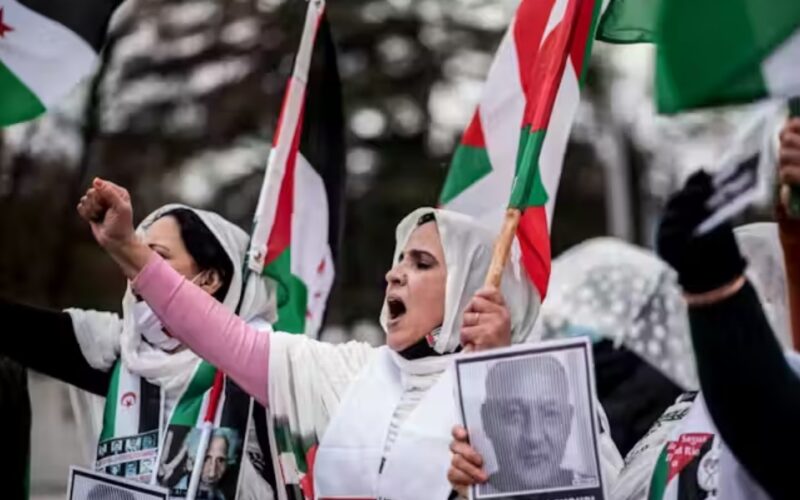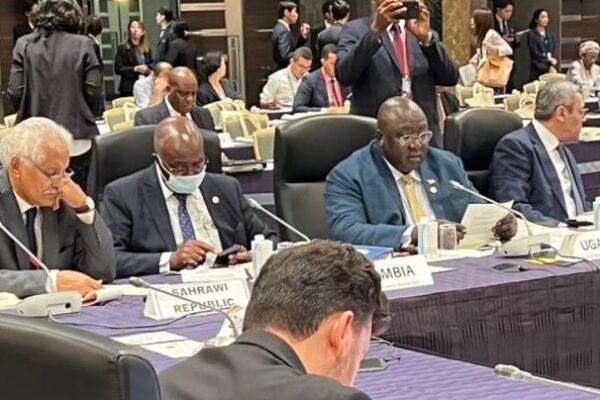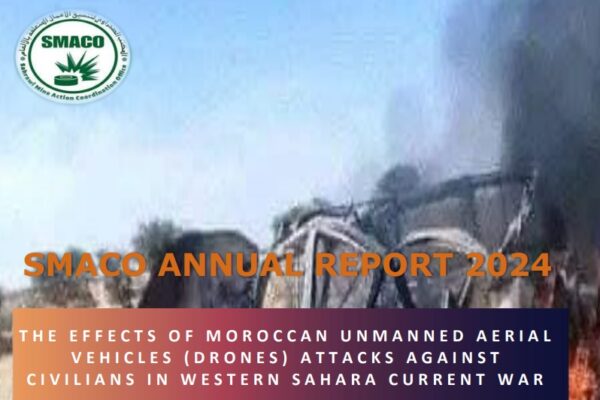Human Rights

Western Sahara: Denial of self-determination and human rights abuses
In May 2006, and for the first time since the UN adopted the famous General Assembly’s resolution 1514, a delegation from the Office of the United Nations High Commissioner for Human rights visited Western Sahara to investigate the human rights situation in this last colony in Africa. The mission accomplished its task by writing a report concluding that:
‘1. As has been stated in various UN fora, the right to self-determination for the people of Western Sahara must be ensured and implemented without any further delay. As underlined above, the delegation concludes that almost all human rights violations and concerns with regard to the people of Western Sahara, whether under the de facto authority of the Government of Morocco or of the Frente Polisario, stem from the non-implementation of this fundamental human right.’
Nevertheless, this report was kept under embargo because a permanent member in the UN Security Council, France, supported Morocco to lobby for the rejection of any kind of protection and monitoring of human rights in Western Sahara.
Western Sahara is clearly defined by the international community as a ‘Non-Self-Governing territory’, whose people are recognised as ‘the people of Western Sahara’ and are entitled according to the different UN resolutions adopted since 1963 to exercise a genuine right to self-determination to chose between independence, self-determination and autonomy with an existing political entity; yet, the people of this territory are still denied their right to decide the future of their country.
As a result to this denial, many anomalies are marking the situation of the territory and the lives of its people. Morocco systematically violates the political, economic, social, cultural and environmental rights of the people of Western Sahara in total impunity.
self-determination and the future of peace in the world
Arab revolutions proved one basic thing: That the people will fight for their basic right, and most important for their sacred right to their homeland and its future. No regime and no power can deprive a population of its sovereignty over its homeland, its natural resources and its innate right to decide the political future of its country. This is the main lesson that the Arab spring is giving the world, and this is exactly what the Saharawis have been fighting for since the first days of the colonisation of Western Sahara in 1884.
The Saharawi people fought against all colonial invaders of their country including the French and the Spanish, and they were not given a choice but to fight against their own brothers and neighbours, Morocco and Mauritania, when these two countries violated this brotherhood.
The case of the Western Sahara is a manifest proof of the failure of the international system that is governed by few powerful states, the five members of the Security Council, who made of the UN the biggest non-democratic organisation in the world.
Western Sahara is recognised by the so-called international community as a Non-Self-Governing territory; the Saharawi people are recognised as the party that has got the legal and legitimate sovereignty over the territory; but still the world looks the other side while Morocco continues to illegally occupy Western Sahara and violates human rights with total impunity. Worse, France opposed any kind of monitoring or protection of human rights in Western Sahara while it champions the defense of human rights in other parts of the world to the point of using armed force in Libya.
On the other hand, the Saharawi people have always been denied an opportunity to communicate their sufferings to the Arab world especially because of the shameful position the Arab states are adopting from the conflict since the seventies.
Civil and Political Rights
Morocco militarily invaded Western Sahara on 31 October 1975 in flagrant violation of the UN Charter and in violation of the Saharawi people’s right to their land. Western Sahara was then a Spanish colony and the UN had reached the agreement with the government of Madrid to organise a referendum for the Saharawi people in 1975. Instead of that, the Spanish weak government of the dying Generalissimo Franco was forced by France and Morocco to sign an illegal tripartite agreement with Morocco and Mauritania according to which the two Arab countries divided the land of Western Sahara and its people into two zones, while Spain maintains the privileged status keeping 30 percent in the phosphate exploitation and a priority in the exploitation of fishing resources in the Saharawi rich waters.
Morocco has thus violated the Saharawi people’s right to self-determination and as a result kept violating their civil and political rights to: physical integrity and safety and their right to the protection from all kinds of discrimination, in addition to their individual rights such as freedoms of thought and conscience, speech and expression, religion, the press and of movement. These Moroccan violations generated a set of crimes against humanity and crimes of war in addition to phenomena such as forced disappearances and the systematic practice of torture by the different Moroccan intelligence military and police corps.
The Moroccan army committed atrocities against the Saharawi population in the first years of the invasion, killing thousands of Saharawi families, especially nomads, poisoning waters in the desert and exterminating livestock which was the main economic wealth of the Saharawi people.
The Moroccan Consultative Council for Human Rights recognised these crimes in a report it elaborated for the Human Rights Council in 2010. In this report, that was used within the HR Council without much advertisement, Morocco recognised the army’s responsibility in the death of some 352 Saharawis killed according to the same report ‘because of bad conditions of imprisonment’ in different Moroccan secret detention camps. No other measures were undertaken to face this crimes, since the families of the victims never received information from the state before they accidentally read this report after some organisations spread it around.
The violations never stopped since 1975 indeed. Hundreds of Saharawis experienced forced disappearance, some for more than 15 years in secret detention and inhumane conditions of imprisonment. The majority of these victims were suddenly released in 1991, but the phenomenon, again, didn’t stop because one of the latest cases of disappearance is as recent as 2005 involving 15 young Saharawi activists who disappeared because of their participation in the popular uprising of 2005.
In addition to the phenomenon of disappearance, the Moroccan authorities systematically practice torture against demonstrators, prisoners, arrestees not only in prisons or police stations but also in streets and outside the cities. Since 2005 many demonstrators have been arrested by police but never taken to police stations; they are driven to the outskirts of the cities, beaten to death, sometimes raped and abandoned in most cases unconscious 40 or 50 kilometres away from the cities.
Demonstrations in Western Sahara are always faced with violent police interventions. Thousands of Saharawis have been injured, arrested, tortured, beaten or even killed after they participated in peaceful demonstrations. Police do not tolerate demonstrators who lift Saharawi flags or chant slogans in favour of independence of their land.
Saharawi human rights organisations without exception are considered illegal by the Moroccan authorities and treated as such. Even in the case of the Association of the Victims of Gross Human Rights Violations Committed by the Moroccan State (ASVDH) which was given a high court decision to work legally under Moroccan laws, the Moroccan authorities never recognised its militants’ right to monitor the human rights situation. Its president, vice-president and member of its bureau are victims to different human rights abuses; some of them are now in prison.
Another human rights organisation, the Collective of Saharawi Human Rights Defenders (CODESA), chaired by the emminent human rights defender, Ms. Aminatou Haidar, was not allowed to operate, and is still banned. Morocco is imprisoning now many human rights defenders, to name just a few: Naama Asfari, Ahmed Lemjid, Ahmed Sbaai, Brahim Ismaaili, Tahlil Mohamed, Banga Cheikh and Hafed Iaaza. There are 64 Saharawi prisoners of conscience right now in Moroccan prisons, 23 of whom went on a hunger strike for 38 days demanding a fair trial or an immediate release after having spent 14 months without trial. They were arrested in November 2010. 14 months after their detention they still wait for a trial, while Morocco is determined to bring them before its martial court in Rabat.
Saharawi prisoners of conscience are denied procedural fairness in law, such as the rights of the accused, including the right to a fair trial; due process; the right to seek redress or a legal remedy. Saharawis in general are denied the rights of participation in civil society and politics such as freedom of association, the right to assemble and the right to vote in a referendum on self-determination to decide over the political future of Western Sahara.
Social And Economic Rights
Since 1975 Morocco led a systematic policy of plundering of the natural resources of Western Sahara without the consent of its people or their legitimate representative, POLISARIO liberation movement. In 2002 the UN Security Council asked Under-Secretary General of the UN for Legal Affairs, Hans Corell, to look at the legality of the exploitation of the natural resources in Western Sahara. The UN jurist clearly ruled that it is illegal to exploit the resources of the Non-Self-Governing territory as long as the decolonisation process is not finished.
In 2016 and 2018, the European Court of Justice issued two landmark decisions against the European Union trade agreements with Morocco, considering them illegal if they include products originating from Western Sahara, knowing that EU reports already established that 91% of fishing products traded with Morocco are originating from the occupied territories of Western Sahara. Yet, the EU shamelessly renewed its agreements with Morocco in total violation of its own Justice’s decisions.
Morocco propaganda has always spread false information about what it calls ‘The process of development and progress of the Sahara’. In 10 October, 2010, more than 20,000 Saharawi citizens from all generations built 8,000 tents in the famous protest camp of ‘Gdeim Izik’ 12 kilometres east the occupied capital of Western Sahara, El Aaiun, ‘to demand the most rudimentary economic and social rights Morocco is depriving them of’, they said. The protest camp that was described by the American philosopher, Noam Chomsky, as the starting point of the Arab Spring, was for demanding the people’s right to work, housing, to social services such as health care and an adequate standard of living and their right to profit from the wealth of their country, but also their right to dignity and their political rights. The Moroccan response came one month after in 8 November 2010. The 8, 000 tents were burned down by the army, thousands citizens were arrested, beaten, injured, hundreds of them were detained for days and 23 were kept in prison and are going to be brought before martial court.
In all Saharawi cities different social groups are organising demonstrations, sit-ins and hunger-strikes to demand basic economic rights. But the normal response from the Moroccan authorities is oppression. Saharawi organisations assert that Morocco is adopting a systematic policy to impoverish the Saharawi citizens in their own country. Saharawis are denied the right to work, they are denied opportunities of investment in many sectors, they are subjected to all kinds of economic restrictions if they defend Western Sahara independence. Most of the time they are dismissed from work, their salaries frozen or they are deprived of any kind of promotion in their jobs if they are actively in favour of the right to self-determination.
Saharawi students find a lot of restrictions that hinder their enjoyment of the right to education. Students have to travel to the Moroccan cities to study because the Moroccan authorities didn’t build a single university or high school in Western Sahara. Secondary school students are daily harassed by police. Since 2005 the Moroccan authorities posted police and soldiers inside primary and secondary schools to stop students from organising peaceful demonstrations. This armed presence usually generates confrontations and human rights violations.
Cultural Rights
The first thing Morocco attacked in 1975 is the nomadic life of the people of Western Sahara. They forced thousands of people to move to the cities, thousands others were killed during raids or forced to flee their country seeking refuge in the neighbouring Algeria, where they are still living. Since 1976 in the Saharawi refugee camps they are relying on international aid.The Moroccan authorities also attacked the Spanish component of the Saharawi culture. They banned the study and use of Spanish from school since 1977. Hundreds of Saharawi students couldn’t finish their studies because of the change of the curriculums.
Lately, the Moroccans are even attacking the use of the traditional tents or any kind of tent by Saharawis as a reprisal against the population after the use of the tent as a symbol in the Gdeim Izik protest camp in 2010.
Saharawi writers can not print books about the Saharawi culture, history or politics. Most of them exercise self-censorship because they are forced to find false links between the Saharawi culture and the Moroccan one or their books would be banned. Morocco went further in putting the Hassania language (the Saharawi dialect) in the Moroccan constitution as a Moroccan dialect! The Moroccan authorities organise many cultural festivals to promote the idea that the Saharawi culture and heritage is Moroccan. On the other hand Saharawi associations and intellectuals can not express their own views on these attempts of appropriation of their culture by the colonising power because they risk detention and oppression.
Destruction Of Environment
Morocco started its invasion of Western Sahara poisoning wells and the scarce springs of water. The Moroccan army was given orders by the Moroccan King Hassan II to kill anything that moves in the desert to force the Saharawi nomads to move to cities so that his authority could control the population.
Saharawi survivors talk about terrible raids against livestock. Camels, goats and cheep were the main cattle raised by Saharawi nomads. Each family of nomads used to own hundreds of animals. In 1976 Saharawis were fleeing for their lives from Moroccan air force raids that used Napalm and White Phosphor bombs against them. Thousands of lives were lost away from the eyes of the “civilised” world that was applauding the Moroccan ‘Green March’. Hundreds of thousands of animals perished too and so thousands of families were reduced to extreme poverty, and were therefore forcibly displaced to the cities or fled the country to seek refuge in neighboring countries.
Further, the Moroccan army built the biggest military walls now existing on earth. Six walls were built from 1981 to 1987 around the main Saharawi cities to “protect” the main natural resources behind a well defended wall so as to plunder the resources without big trouble. Morocco built around 4,000 kilometres of sand walls, using more than five million landmines, according to the most modest estimations. Nowadays, only 2,700 kilometers of this wall are operational though the rest of walls remain dangerous because of the arbitrary use of landmines by the Moroccan army during the seventies and eighties.
The Moroccan wall doesn’t only part the Saharawi people in two parts, but it also causes a huge problem for the flow of waters (rivers and sources of water), and causes serious damage to the Saharawi livestock. It also destroys Saharawi nomadic free movement traditions and constitutes a constant danger on the lives of individuals and animals because of landmines.
The Moroccan wall also affects the wild animal life in Western Sahara. The Saharawi Gazelle is under threat of extinction because of landmines and because it was deprived of the freedom of movement in the desert. A similar fate is threatening the different species in the once rich Saharawi waters that risk becoming dangerously poor because of over-exploitation by Fishing companies from many countries, mainly from Europe, but also Japan, South Korea and others.
Conclusion
The right to self-determination is one of the main pillars of international law, and is one of the main guarantees for the establishment of peace, democracy and respect of human rights in the world. There are many international attempts to normalise the violation of the right to self-determination by some big powers and through their proxies such as Morocco, and the aim is always to set chaos and destabilise order in the world so as to profit from possibilities of exploiting natural resources of weak peoples.






